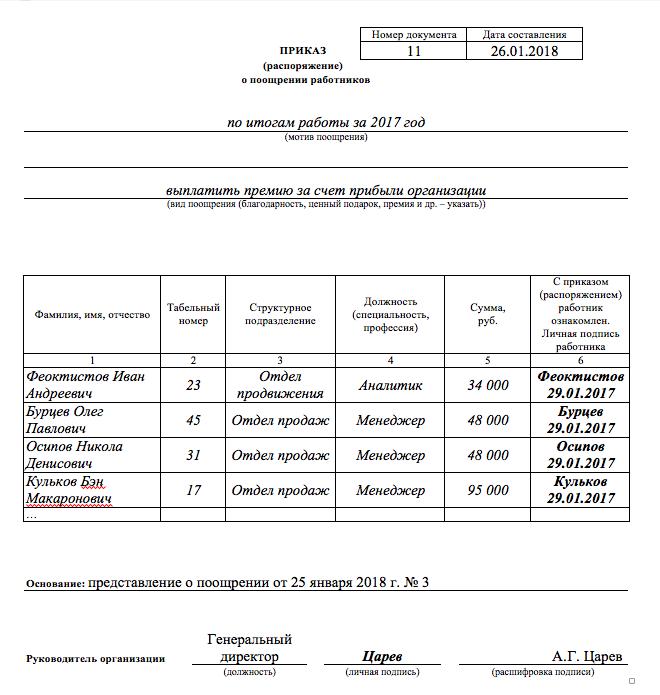Each employee is always happy to receive for his work not only a fixed value of the payment, but also a certain amount of reimbursement as bonuses.
It is always important for any employee to know why he was paid a remuneration, how it is calculated, in which documents the rules for its formation are set forth.
The employer has one difficulty in this regard - the solution of the question of what should be in the wording of the bonus, as often different employees are rewarded for different merits. All aspects of bonuses will be considered in the framework of this article.

What is a premium?
The most fundamental definition of this concept: it is the amount that is given to the employee on top of his remuneration for the fact that he worked for a certain period of time with increased rates.
Simply put, a prize is an incentive that depends on the results of the entire company, as well as the quantitative or qualitative characteristics of the employee’s labor.
The function of incentives for work and bonuses is to provoke the employee, pushing him to work more actively and productively.

Bonus concept
The employee can find out information about what types of bonuses are in the company when he applies for a job.
Bonuses to employees and its role in developing a global development strategy for the company is very high.
This applies not only to production bonuses, when a person realizes what kind of merits and responsibilities he will be rewarded, but also to one-time amounts (for example, marriage, childbirth, final exams, etc.)
In Art. 68 of the Labor Code of the Russian Federation, it is indicated that before signing the labor contract, the employer must familiarize the employee (under signature) with the internal order and other internal rules of the company specifically related to his future labor activity, including information about the bonus options.
If the company enters into an agreement with an employee such as civil law, in other words, hires him as an executor, fulfilling the obligations of the agreement on a paid basis, then there is no point in talking about the award.
If the employer uses the word "premium" when concluding a civil contract, this contract may be reclassified as an employment contract. If the employer wishes to reward the person with whom such a contract is concluded, he needs to write about the change in the cost of his services under the contract.
The employee has the right to receive information on how the bonus is calculated, in other words, he must be aware of what he needs to do in order to receive this bonus.
The Tax Code of the Russian Federation contains article 252, which states that all expenses for bonuses are accepted as expenses of the company only when they are reflected in labor and collective agreements.
Therefore, the employer must reflect bonuses in the employment contract or indicate in it a link to the collective contract, which contains information about the bonuses.
We highlight the prerequisites for employee bonuses in companies:
- A bonus may be awarded to an employee for excellent work in the company (implementation of a sales plan, lack of disciplinary measures);
- the prize may be awarded for special events, including the birthday of the company or employee;
- You can reward employees for full time work, that is, the absence of sick days, days off at their own expense.

Statutory provisions
The question of how to properly reward employees is very relevant. It is prescribed in the applicable law.
In accordance with the current regulatory legal acts of Russia, we note the points:
- The bonus is paid to staff if the document establishes the conditions that determine the relationship between the employer and the employee, in other words a collective contract or an employment contract. Therefore, the award cannot be considered a mandatory payment for the employee.
- Bonus - part of the employee’s salary.
- The calculation of premiums and the conditions for their payment are set forth in Art. 135 Labor Code of the Russian Federation. This provision corresponds to the ability and right of the head of the company to form the amount of the incentive amount and the payment rate.
- Deprivation of employee incentive payments is studied in Art. 193 of the Labor Code of the Russian Federation.
- Issues related to the taxation of premiums are regulated by the Tax Code of the Russian Federation and are set out in the article. 255.

Advantages of organizing a bonus system for a company
Bonuses are an additional way of employee income, which is paid specifically based on the results of his labor activity, but not for everyone, but only for those who work better.
Questions about what characteristics of the employee’s work, how he is worthy of payments, according to Art. 191 of the Labor Code of the Russian Federation, determined by the employer.
The company's activities depend on how correctly the aspects of the assessment of payments are determined and the entire incentive mechanism is built in it.
Incorrect staff remuneration does not contribute to the development of the company, but is its potential threats. The method of calculating awards, incomprehensible to employees, can become a cause for conflicts within the company.
On the contrary, a well-thought-out system of incentive payments for employees is a massive motivation among them for high-quality personal and team work in order to increase productivity and improve staff skills.

Disadvantages of organizing a system in a company
The flip side of the bonus is some disadvantages.
Common flaws and errors in bonus systems that companies struggle with when launching projects to stimulate can be distinguished as follows:
- groundless application of very complex characteristics for assessing labor productivity or a lack of explanation of cause and effect relationships in the employee reward system;
- lack of research on the effectiveness of the bonus system;
- there is no significant difference between the bonus of productive and ineffective employees;
- in the bonus system, the balance of punishment and remuneration is not respected;
- The prize in almost everything depends on the opinion of managers and managers who are paid "by agreement."

Types of Prizes
There are two types of payouts:
- Premiums provided as part of the remuneration system based on certain characteristics and criteria that have been developed in the company. Such merits are a share of material incentives for employees and motivate them. They are paid at regular intervals (every month, once a year, every quarter, etc.). In addition, in this case, the amount of premiums is clearly established. In this situation, the fact of paying a bonus is important, that it is a stimulating payment is very important for the employer.
- One-time prizes that are not part of the remuneration system are paid to the employee for certain merit in work, length of service, for certain events (for example, anniversaries and professional holidays).

The procedure for registration of bonuses in the organization
Consider the issue of how to properly award bonuses to employees.
Based on the fact that the labor contract is concluded with the employee, then you need to take into account several fundamental details. The employment contract should clearly indicate under what criteria and in what amount the bonus will be paid.
How to correctly identify the incentive conditions in the contract in this case?
Simple rules for employee bonuses are listed below:
- The bonus is immediately indicated in the employment contract. The employer occasionally uses this option, since in this case he will be able to change the data on payments only if he is sure that the employee will agree and sign these changes. But, if the employer still decides to include the bonus in the labor contract, he must indicate its amount or formula for calculation. It should be understood that if the award is indicated in the employment contract, the company does not have the right not to issue it.
- The employment contract stipulates that bonuses are paid in agreement with the collective contract. At the same time, the collective agreement indicates who is awarded, for what and how. However, a collective contract is a rather complicated document, changes in which are even more difficult to implement than in an employment contract. Therefore, most companies choose the third option, presented below.
- Bonus Regulation. This document is convenient as it is not a bilateral agreement. However, in an employment contract, a reference to this document must be obligatory.

Bonus Order
The order of the head is executed in standardized forms that have been approved by law.
The instructions for the use and completion of the forms indicate that the bonus order:
- used to register and record premiums and incentives for the growth of the company's profitability;
- signed by the head or authorized person;
- declared to the employee upon receipt.
Based on the order, an entry is made in the individual card and his work book.
A sample order for employee bonuses is presented below.

Bonus Regulation
This situation is defined for the entire organization as a whole, while it applies to all employees at once.
The content of the bonus clause may be as follows:
- general provisions (who has the right to receive remuneration, in accordance with what rules they are accrued);
- sources of bonuses (if payments are paid at the expense of incentive funds or company revenues, it is necessary to indicate from which funds the bonuses are also paid);
- bonus indicators;
- circle of persons for bonuses;
- frequency of payments;
- percentage of premiums or a specific amount;
- conditions for reduction and non-payment of premiums.
Sometimes in position indicate the basis for depremiation.
Base statement
For what it is possible to award an employee and the wording of the grounds may vary depending on what the prize is awarded for. You need to understand what regulates the procedure for fixing the wording in the remuneration system, and which of them is better to apply in certain cases.
What can an employee be rewarded for? The wording of the grounds in these situations can be indicated as follows:
- for the implementation of the work plan;
- for significant merit in the work;
- for the timely submission of reports;
- for the implementation of particularly responsible work;
- for the initiative;
- for quality work;
- for holding some events;
- for continuing education.
The conditions of the awards are determined on the basis of the employee incentive scheme developed by the organization.
When applying general payments, the main condition is the implementation of certain (often averaged) characteristics of the entire company.
If the planned performance of the company is successfully achieved, the award is appointed by general order for a month, quarter or other period.
What can an employee be rewarded for and the wording of the grounds for such bonuses look like this:
- for the successful completion of the task;
- for the high quality of perfect work;
- for achieving high results in work.
When using a personally targeted bonus system, the payment of amounts may not be determined by the time period, but is paid for certain achievements. Accordingly, the order contains a description of the merit:
- for the successful representation of the interests of the company in negotiations with the client and the conclusion of a profitable contract;
- for the implementation of a particularly difficult task;
- for introducing a creative approach to solving the problem.
Successful participation of employees in various competitions is a big plus for the image of the company.
It is completely reasonable to conduct various competitions with material incentives. With a reasonable approach, the financial effect of improving the qualifications of employees, increasing the quality of work, and collective work will be an order of magnitude higher than the funds spent on bonuses.
What can an employee be rewarded for and the wording of the grounds for such bonuses look like this:
- for participating in a professional skill contest;
- for representing the company in an international competition;
- for winning mini-volleyball competitions.
Another method to improve the organizational climate in the company and increase the responsibility of employees is to pay personal bonuses that are suitable for certain dates in the life of the employee (birth of a baby, marriage, anniversary, etc.).
The fundamental nuance of the company is the desire to keep trained and experienced employees. Prizes for loyalty to the company, long-term successful work in it - all this is of great importance.

Conclusion
In many enterprises, the salary of workers is not limited to one salary. Employers provide incentive payments to motivate employees.
These are various benefits, payments, bonus bonuses, which are assigned in addition to the salary part of the salary. Regulatory legal acts provide for various types of additional payments that professional employees can receive.
Premium systems should provide the best characteristics of the company's economic system, deliberately stimulating positive changes with a positive moral perception by employees of the provisions of such systems.
To a significant extent, this awareness is justified by the features of corporate culture, therefore they must be taken into account.
Competent and beautiful wording in the bonus order is very important when signing employment contracts for both employees and the employer.
